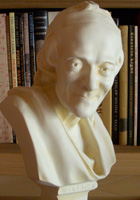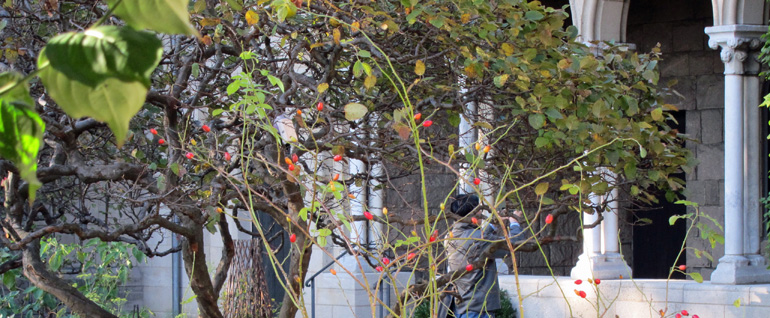Out & About:
December Doings
31 December 2010
Friday, December 31st, 2010
You might think, from recent entries, at I’ve been doing nothing but reading The Kindly Ones and other earnest books, but I’ve had a few nights out in the past weeks.
The second Orpheus Carnegie Hall concert of the season featured the stunning British soprano Kate Royal. Ms Royal sang Britten’s Les Illuminations, a song cycle, set to Rimbaud, that gives the composer’s countrywomen a chance to show off their Continental chops. After what struck me as an uncertain beginning, Ms Royal’s voice bloomed into the music, but when a beautiful woman sings “Being Beauteous” beautifully, it is hard to say where artistry stops and good luck begins. A beautiful young woman, I should say; time will settle the mystery. My companion and I, old school gents, felt that a slip ought to have been worn beneath the clinging white satin gown over which the singer seemed always about to trip. (If wardrobe is going to malfunction, let’s get it over with.)
The concert opened with Barber’s Capricorn Concerto. This astringent music, with its oddly chosen scoring for flute, oboe and trumpet, was very well played, as more or less goes without saying for an Orpheus performance. I was carried back into my first radio days in Houston, when I discovered, thanks to music such as this, that there was a difference between the modern and the avant-garde. Barber was unambiguously a modernist who wished to please and entertain, and I remembered trying to imagine the state of mind of a modernist bourgeois listener who would be pleased and entertained by the Capricorn.
After the interval, we had Beethoven’s Seventh Symphony. I had been thinking about the Orpheus way of making music, with its core committees and meetings and endless rehearsals, and I was beginning to realize that most musicians would probably not care to take on so much work. And that’s fine: if Orpheus shows us that you can make great music without a conductor, that doesn’t mean that there is anything wrong with conductors. What it does mean, though — and with blazing humanity — is that there is a big difference between music made by an orchestra executing a single mind’s idea of what’s important, and music made by a group of musicians each of whom has his or her own cohering idea of what’s important. The first tends to be more powerful, but the second is unquestionably more interesting.
The Metropolitan Musem Artists in Residence gave the first of three recitals at Grace Rainey Rogers. First up was Beethoven’s seldom-played Opus 44, a set of variations for piano trio. I knew the work vaguely, as I also knew the concluding Dvorak, because I’d put it on one of my Nano playlists. In between, Edward Arron played Luciano Berio’s Les mots sont allés, about which I don’t remember a thing, not a thing, except that it was evidently written to be played beautifully. Then we had a lovely string trio by Gideon Klein, a Moravian composer who helped to organize the musical establishment among inmates at Theresienstadt (where, one imagines, this work had its premiere) before meeting his own death at Auschwitz. The trio is the transporting souvenir of a mind that is very happy to be alive. As soon as I got home, I ordered a recording from Arkivmusic, because I’d like to see if it’s possible to get to know this music so well that the horrible circumstances surrounding its composition evaporate.
For Dvorak’s Piano Quartet, Opus 87, Jeewon Park came back out to join the three principals of  MMArtists, who in addition to her husband, Mr Arron, include violinist Colin Jacobnsen and violist Nicholas Cords. The best performances of Germanic chamber music from the Nineteenth Century seem always to suggest that excellence of execution, no matter how manifest, is of secondary importance to the expression of the musicians’ friendship, and Mr Arron and his friends reminded us that this tendency attains its high point with Dvorak.
Kathleen begged me to wait to see The King’s Speech until she could see it with me, and I did. I liked it and was very heartwarmed, but I was surprised at how brown and quiet-looking it was. Every attempt appears to have been made to strip the picture of regal flash. Home Life at “The Firm” would make a good subtitle, if smart  movies had subtitles (why is that only the most brainless ones do?) Colin Firth, although a very handsome man, does not have the interestingly sleek, quasi-“Oriental” features of George VI; nor does he project majesty. Well, of course not; this is a movie about a stammerer who is taught the confidence to speak plaintly by a failed actor just this side of a mountebank. The movie’s funniest moment is also its most rude: the Duchess of York (the magnificent Helena Bonham Carter) trills that dinner with the family of her husband’s helper would be delightful and then immediately rolls up this prospect in the claim of a “previous engagement.” Without ruffling her composure in the slightest, the actress projects the alarm of a cat in free fall.
Geoffrey Rush, as the self-taught speech therapist Lionel Logue, is grand and craggy enough to anchor the story through its gales of potential uplift; there is also a terribly important scene in which the Duke of York (as he then still is) berates and spurns Logue with a heartlessness that makes you want to summon the RSPCA. And yet the story does not follow in the footsteps of The Madness of King George. This King George actually apologizes, which is also terribly important.
I wanted to see more of Eve Best, who plays Wallis Simpson with breathtakingly impudent self-assurance; what I’m probably clamoring for is a series of movies in which Ms Best and Guy Pearce enact further adventures of the Windsors. Mr Pearce is thoroughly convincing as “David,” a man who, all who knew him seem to agree, was fundamentally childish and inconsequential but also blessed with a godlike grace that his brother lacked. I also wanted to see more of Jennifer Ehle, who plays Mrs Logue; but then I always want to see more of Jennifer Ehle. Don’t you sometimes think that Jennifer Ehle is the Meryl Streep upgrade?
Another true-story movie that I saw but did not get round to writing up was the one in which Ewan McGregor plays a cutie by the name of Philip Morris — I Love You Philip Morris turns out to have nothing to do with smoking. Not a frame of this frolicsome film went by without my wondering, bewildered, how it ever got made. Where is the audience for a romp about a nutty gay con man? Jim Carrey’s brio is so extreme that his scenes feel animated, to accommodate cartoonishly stretched limbs and leers — but we expect this of Mr Carrey. Philip Morris is a must-see movie because of the bashful glances that Mr McGregor casts through the magnolias of his eyelashes.Â
¶ At MTC, we saw Spirit Control. (Kathleen also saw The Pitmen Painters; Ms NOLA took my ticket to that show.) The interesting thing about this play by Beau Willimon is that it works very well as a theatre piece but fails again and again as a formal structure. At the very beginning, Adam, an air-traffic controller, attempts to guide an inexperienced woman through the landing of a small plane. This increasingly hair-raising scene ends in a way that guarantees the audience’s sympathy with and concern for Adam, and a plainly naturalistic sequel would have been satisfying. As it is, Spirit Control ought to crash as disastrously as a misguided plane, but the performances are so strong that it doesn’t matter that we can’t go along with the playwright’s arty meta complications. We still care.









